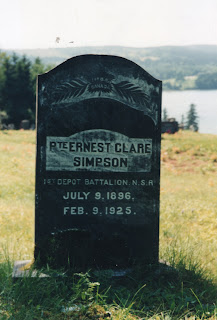Ernest Clare Simpson was born in Middle Manchester, Guysborough County, on July 9, 1896, the youngest of William Gladstone and Emma Alma (Torey) Simpson’s 14 children. Both of his parents were Guysborough County natives. William was born in Manchester on April 17, 1845, the son of Thomas and Elizabeth Ann (Horton) Simpson, while Emma was born in Guysborough Intervale on October 18, 1854, the daughter of John and Elizabeth (Brimer) Torey. The couple were married at Manchester on March 13, 1873.
 |
| Private Ernest Clare Simpson |
William and Emma raised a family of 14 children—daughters Iona Gertrude (DOB August 16, 1874); Sarah Alice (DOB August 27, 1876); Florence Augusta (DOB March 5, 1879); Annie Laura (DOB October 21, 1884); Cora Beatrice (YOB 1886); Jenny Edith May (DOB September 21, 1890); Winnifred Clyde (DOB October 8, 1893); and sons Milton Simpson (YOB 1877); Harold Edwin (DOB February 18, 1878); Lewis (YOB 1883); William Gladstone (DOB November 30, 1880); Arthur Augustus (DOB July 22, 1882); Gordon Torey (DOB February 21, 1887); and Ernest Clare (DOB July 9, 1896).
1881 and 1891 Canadian census records list William Gladstone Simpson Sr.’s occupations as “farmer” and “carpenter.” By 1911, the family had relocated to Boylston, where William held the office of postmaster. The six oldest Simpson sons were for the most part beyond the median age for military service during the First World War. Ernest’s 1896 birth year, however, made him an ideal candidate.
On May 8, 1918, Ernest was conscripted into service at Halifax, NS, under the terms of the Military Service Act (1917). He immediately reported to Camp Aldershot for military training. While there, he was hospitalized with measles, a common camp affliction, in mid-June. Discharged to duty in early July, he departed for overseas on August 2, 1918.
%20and%20friend.jpg) | |
| Pte. Ernest Clare Simpson (left) and an unknown soldier |
Canadian forces were directly involved in the 100 Days Campaign that commenced at Amiens on August 8, 1918, and brought the war to an end on November 11, 1918. Ernest’s late overseas arrival meant that he was not assigned to a combat unit on the continent during the campaign. Instead, he remained in the United Kingdom throughout the winter of 1918-19.
As active combat units in Europe were sent home first, reinforcement units in the United Kingdom were among the last to depart for Canada. While waiting the return home, Ernest was admitted to Ripon Military Hospital on May 15, 1919, with pain in the left side of his chest. The following day, he was diagnosed with pleurisy—inflammation of the tissues that line the outside of the lungs and inner chest wall. A later note on his medical chart contained the following comment: “Left side: considerable effusion [fluid build-up] which has now cleared up…. No TB [tuberculosis] in sputum. Needs time… [to recover in] Special Canadian Hospital.”
On June 25, Ernest was discharged to Epsom Military Convalescent Hospital. Four days later, he was admitted to 16th Canadian General Hospital, Orpington, for treatment of “pleurisy and influenza.” Medical notes also included a reference to the possible presence of tuberculosis.
Ernest was discharged from medical care for a second time on July 4, 1919. Three weeks later, he departed from Glasgow, Scotland, aboard the Saturnia, destined for Montreal, QC. Upon arriving in Canada on August 4, he travelled by train to Halifax, where he was formally discharged from military service on August 13, 1919.
Ernest returned to the Simpson family home in Boylston, where he resided with his parents and two older brothers, William Jr. and Gordon. Following his father’s death on April 23, 1924, Ernest assumed the position of postmaster. Shortly afterward, however, the health issues that initially surfaced during his time overseas returned.
 |
| Private Ernest Clare Simpson's headstone, Boylston Baptist Cemetery |
On June 9, 1924, Ernest was admitted to the Nova Scotia Sanatorium, Kentville, for treatment of pulmonary tuberculosis. Over the next eight months, his health worsened. Private Ernest Clare Simpson died in the Nova Scotia Sanatorium on February 9, 1925. His remains were transported to Boylston, where he was laid to rest in the Baptist Church Cemetery.
Special thanks to Winn (Manson) Campbell, Meadowvale/Sherbrooke, NS, who provided the images included in this post and brought Ernest's story to my attention. Ernest is the 141st known Guysborough County First World War fatality.
No comments:
Post a Comment